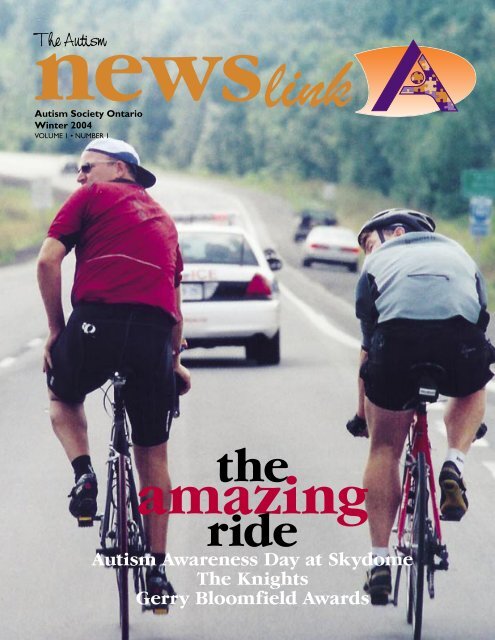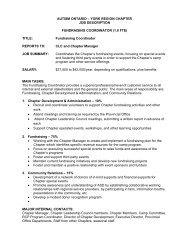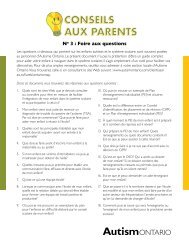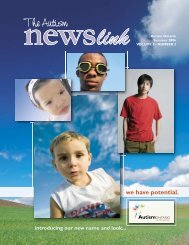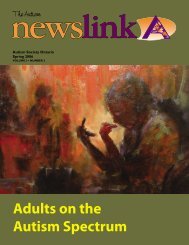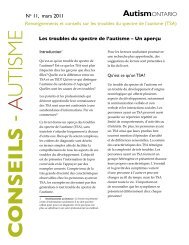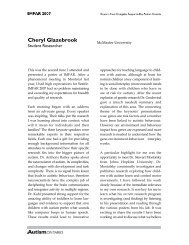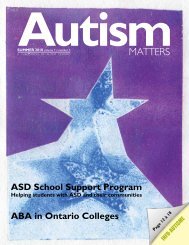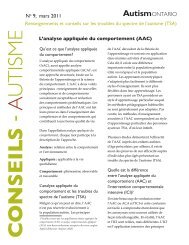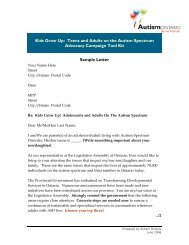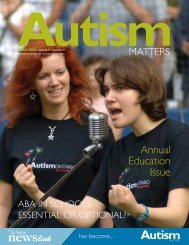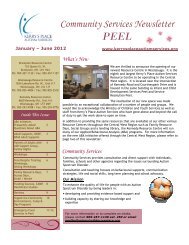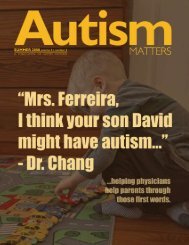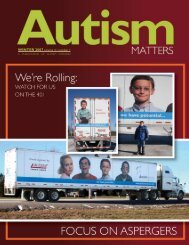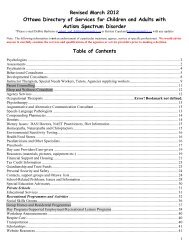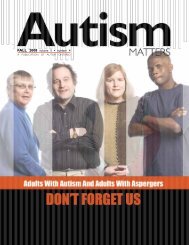Winter - Autism Ontario
Winter - Autism Ontario
Winter - Autism Ontario
You also want an ePaper? Increase the reach of your titles
YUMPU automatically turns print PDFs into web optimized ePapers that Google loves.
The <strong>Autism</strong><br />
newslink<br />
<strong>Autism</strong> Society <strong>Ontario</strong><br />
<strong>Winter</strong> 2004<br />
VOLUME 1 • NUMBER 1<br />
the<br />
amazing<br />
ride<br />
<strong>Autism</strong> Awareness Day at Skydome<br />
The Knights<br />
Gerry Bloomfield Awards
The <strong>Autism</strong><br />
news<br />
Chapter Presidents of ASO<br />
Brant & County<br />
Clifford Gowan 519-759-8891<br />
Cambridge<br />
Dianne Fitzgerald 519-621-4839<br />
Chatham-Kent<br />
Elizabeth Carnegie 519-358-1823<br />
Dufferin<br />
Susan McCreary 519-942-2348<br />
Kim Armstrong<br />
Durham<br />
Leah Myers 1-866-495-4680<br />
Grey/Bruce<br />
Linda Dow-Sitch 519-371-7180<br />
Kingston<br />
Barb Dafoe<br />
613-546.6613X388<br />
Halton<br />
Chuck Learn 905-825-1344<br />
Hamilton-Wentworth<br />
Teresa Simms-Obidi 905-545-9643<br />
Huron Perth<br />
Kim Souch<br />
London<br />
Patricia Gallin 519-685-8702<br />
Metro Toronto<br />
Luc VanderMeeren 416-489-0702<br />
Niagara Region<br />
Mike Gowan 905-682-2776<br />
North Bay & Area<br />
Yvette Bellefeuille 705-472-6807<br />
Ottawa<br />
Elizabeth McRae 613-230-6305<br />
Region d’Ottawa<br />
Huguette Boisvert-Secretary 613-722-2482<br />
Bernard Delisle<br />
Peel<br />
Joyce Lang 416-390-9193<br />
Peterborough<br />
Beverly Randall 705-748-4793<br />
Renfrew County<br />
Diane Ferguson-Osterholm 613-687-4301<br />
Sarnia/Lambton<br />
Sarah Busby 519-332-2611<br />
Sault Ste. Marie<br />
Barbara Gjos 705-782-6379<br />
Simcoe<br />
Helen Aitken<br />
705-326-2214 X251<br />
Sudbury & District<br />
Joanne Thistle 705-682-0983<br />
Sunset Country<br />
Kim Cariou 807-467-8414<br />
Thunder Bay & District<br />
Michelle Murdoch-Gibson 807-344-9830<br />
Upper Canada<br />
Debbie Keillar 613-347-2488<br />
Waterloo County<br />
Val Johnson 519-742-1414<br />
West Nipissing<br />
Anne Gingras 705-753-5326<br />
Wellington County<br />
Natalie Veltmeyer 519-822-0279<br />
Windsor/Essex<br />
Laurie Golocevac 519-250-1893<br />
York Region<br />
Cindi Buick 905-780-1590<br />
<strong>Autism</strong> Society <strong>Ontario</strong> is a registered charitable<br />
non-profi t organization (#11924 8789 RR0001).<br />
Our Vision: Acceptance and opportunities for<br />
all individuals with <strong>Autism</strong> Spectrum Disorders<br />
(ASD). Our Mission: To ensure that each individual<br />
with <strong>Autism</strong> Spectrum Disorder is provided the<br />
means to achieve quality of life as a respected<br />
member of society. The <strong>Autism</strong> Newslink is published<br />
four times per year. Subscription to The<br />
<strong>Autism</strong> Newslink is included with ASO membership.<br />
Newslink welcomes contributions from its readers.<br />
Send your articles, reviews, letters, comments,<br />
announcements, etc., to Margaret Spoelstra,<br />
Newslink Editor. Inclusions of information not<br />
directly related to ASO are for information only<br />
and individuals, events, therapies, treatments, etc.,<br />
are not necessarily endorsed by ASO.<br />
<strong>Autism</strong> Society <strong>Ontario</strong><br />
1179A King Street West, Suite 004<br />
Toronto, ON M6K 3C5<br />
Phone: 416-246-9592<br />
Fax: 416-246-9417<br />
mail@autismsociety.on.ca<br />
link<br />
8<br />
the amazing ride<br />
Snapshots from last<br />
summer’s bicycle<br />
marathon across<br />
Canada<br />
The inside story...<br />
3<br />
30 Years of Making It<br />
Happen<br />
Eleanor Ritchie presents<br />
a historical summary;<br />
a karaoke snaphot shows that it wasn’t<br />
all serious business at the AGM<br />
A Win/Win Situation<br />
The <strong>Autism</strong> Newslink has a new look! To get our message across<br />
more effectively to a wider readership, we have gone to a fullcolour<br />
magazine layout. In our quest for excellence to solve<br />
the puzzle and raise awareness of <strong>Autism</strong> Spectrum Disorder<br />
(ASD), GEPM Group Inc. has worked with us to provide editing,<br />
design and printing services. They have also secured ads from<br />
businesses and the corporate sponsors listed at the bottom of<br />
this page. Because of this new source of revenue and the narrowing<br />
cost gap between two-colour and full-colour printing,<br />
this magazine comes to you at a lower per copy cost than our<br />
former newsletter. Enjoy the new format. We welcome your<br />
responses and suggestions.<br />
Margaret Spoelstra, Executive Director<br />
12<br />
The Knights<br />
Developing social skills in children<br />
with ASD<br />
by Am Badwell<br />
Other features<br />
The curious incident of the dog in the night-time by Mark<br />
Haddon, Book Review by Alex Meyer<br />
<strong>Autism</strong> Awareness at SkyDome<br />
Emergency Response and Crisis Intervention<br />
CAIRN Review helps parents “navigate the research<br />
maze” Five Awards for New Sibling ScholarshipGerry<br />
Bloomfi eld Awards 2003<br />
Poetry Corner: Life, by Jean Grandbois; I am a happy and<br />
proud boy, by Joshua Sibley<br />
Photo acknowledgements<br />
ASO would like to thank Maria Harrison and Jeff Belanger for many of the Cycle for <strong>Autism</strong> photos.<br />
<strong>Autism</strong> Society <strong>Ontario</strong> is grateful to the following corporate sponsors for<br />
their support of this publication<br />
GrabUGraphics - www.grabugraphics.com<br />
Ho Lee Chow Chinese Food Restaurants - www.holeechow.com<br />
National Service Dogs - www.nsd.on.ca<br />
6<br />
7<br />
10<br />
11<br />
11<br />
14<br />
16<br />
Editing, design and printing services, GEPM Group Inc. www.gepmgroup.com<br />
30 years of making it happen<br />
SPEECH GIVEN BY ELEANOR RITCHIE AT THE ANNUAL AUTISM SPECTRUM DISORDERS<br />
CONFERENCE, JUNE 20-21, 2003 AT CAMBRIDGE, ON. ELEANOR HAS A 34-YEAR-OLD<br />
AUTISTIC SON, PAUL.<br />
I’m honoured to be here to reminisce<br />
about ASO’s past, express what really<br />
matters to me, and tell you my<br />
expectations for its future.<br />
Our organization began as the<br />
result of an article in The Toronto<br />
Star announcing that Corinne Gross, the<br />
mother of an autistic son, Adam, was hosting<br />
a meeting at her house for parents with<br />
autistic children.<br />
Meetings were held and word of the<br />
group’s existence spread. Parents in Ottawa<br />
wanted to join and so plans were made to<br />
form a provincial society.<br />
Bob Hart did the paperwork for incorporation.<br />
He modeled our chapter bylaws after<br />
the ones used by the Women’s Institute of<br />
<strong>Ontario</strong>. We were ready to expand.<br />
Since the smaller cities had fewer families,<br />
chapters were formed to cover regions, for<br />
example Wellington and Durham. London<br />
joined our group soon after, then York.<br />
It was in 1983 that we hired our first Executive<br />
Director. He was only part time due<br />
to money constraints, but we were coming<br />
of age. Since then the organization has continued<br />
to grow and expand, not always at<br />
the same pace, but always moving forward.<br />
In those early years, we had successes and<br />
failures.<br />
Some parents wanted residences for their<br />
children. Initial fundraising came from three<br />
functions organized over three years by Jules<br />
Gross, a Toronto member, hosted consecutively<br />
by Kofflers, CREEDS and Zuckermans<br />
who opened their properties for viewing.<br />
A rural setting was deemed to be the most<br />
appropriate for their needs. The location<br />
was to be between Toronto and Ottawa so<br />
all members would have access. Property in<br />
Thomasburg near Tweed was purchased.<br />
When the government was approached<br />
for funding, they would not give money to<br />
the provincial group. In response, some of<br />
the parents then formed Kerry’s Place and<br />
when Ottawa opted out of the project, the<br />
property was eventually transferred to them.<br />
Soon Ottawa followed their lead and started<br />
residential care in that area.<br />
Fundraising was an ongoing endeavour.<br />
We always need money. Many activities took<br />
place—selling roses, picture frames, lottario<br />
tickets, raffles, and lots of rummage sales. In<br />
the late ’70s, the chapters joined together to<br />
hold a telethon. This would be an opportunity<br />
to raise awareness and of course, just<br />
like Jerry Lewis and Sick Children’s Hospital,<br />
raise lots of money. With lots of enthusiasm<br />
but inadequate planning skills, such as trying<br />
to organize the event over a 90-day period,<br />
it was a total disaster. We were still paying<br />
the bills two years later, but the publicity of<br />
the telethon raised public awareness as had<br />
no other activity up to that time.<br />
Our organization has undergone three<br />
name changes over the past 30 years. It<br />
began as the <strong>Ontario</strong> Society for Autistic<br />
Children. Sometime during the ’80s it was<br />
changed to the <strong>Ontario</strong> Society for Autistic<br />
Citizens. This was done because many of our<br />
children were now adults and we wanted<br />
our name to reflect this while at the same<br />
time keep the same initials. In the ’90s it<br />
was decided to change our name to begin<br />
with <strong>Autism</strong>. The other provincial organizations<br />
across Canada were asked to do the<br />
same. This was done for two reasons: so<br />
that people wanting information about autism<br />
could find us in the phone book under<br />
autism, and to provide uniformity across the<br />
country—<strong>Autism</strong> Society <strong>Ontario</strong>, Quebec,<br />
Manitoba, Canada, etc.<br />
From my experience and observations, let<br />
me tell you what really matters.<br />
I joined the Metro Toronto Chapter in<br />
1974-75. In those years there were very few<br />
services for autistic children. All the recreational<br />
programs were organized and run by<br />
the parents and very dedicated volunteers.<br />
From September to May we had a swimming<br />
program and a cub pack. In the summer we<br />
had a day and residential camp. Since the<br />
swimming and cub programs were only one<br />
hour long, the parents usually stayed and<br />
socialized during that time. The positive<br />
annual general<br />
meeting<br />
p Eleanor Ritchie was<br />
honoured for her contributions<br />
with the establishment of the<br />
Eleanor Ritchie Post-Secondary<br />
Scholarship for Students with ASD.<br />
Being a participating member in our organization<br />
matters.<br />
2\ The <strong>Autism</strong> Newslink <strong>Winter</strong> 2004 The <strong>Autism</strong> Newslink <strong>Winter</strong> 2004 /3
The AGM wasn’t all serious business.<br />
Delegates displayed their talents<br />
and sporting sense of humour with<br />
an evening of karaoke.<br />
benefit of this was two-fold: (1) we could<br />
watch other autistic children in action and<br />
compare them to our own, and (2) we chatted<br />
as parents and gave practical and moral<br />
support. We found we were not alone in our<br />
struggle to raise our child. Others faced the<br />
same challenges.<br />
Those benefits are still found today at the<br />
chapter level. There are meetings where we<br />
connect with other families; guest speakers<br />
offer us new information about education,<br />
health and diet. Some chapters host workshops,<br />
place representatives on the school<br />
boards, and run recreational programs.<br />
The provincial office does not provide<br />
hands-on programs but performs other very<br />
essential services, most importantly, linking<br />
the chapters so they know what’s happening<br />
in the 30 groups. It also lobbies<br />
the provincial government which<br />
provides the money for health<br />
and education programs. It<br />
provides educational material<br />
for families, professionals and<br />
students wanting information<br />
about autism, and it coordinates<br />
provincial events such<br />
as Toonies for <strong>Autism</strong>, etc.<br />
Sometimes we members,<br />
especially parents, become<br />
so focused on chapter activities that we<br />
forget about the provincial part of our organization<br />
and what it does for us. We must<br />
remember that the parts are only as strong<br />
as the whole. We must stay connected in<br />
partnership with it because that is the glue<br />
that holds us together.<br />
Being a volunteer matters<br />
I became involved with the Toronto chapter<br />
in 1974-75. I was treasurer and then president.<br />
I organized rummage sales, raffles, and<br />
with my late husband ran bingos. Volunteering<br />
is fun. It helps you grow as a person, it<br />
challenges you and makes you more caring.<br />
Organizations like ours cannot exist without<br />
many, many dedicated volunteers. Over the<br />
years they have kept the chapters active, run<br />
recreational programs, put on fundraising<br />
events, produced information publications<br />
and government proposals. The list goes on<br />
and on. I’m one of the lucky parents whose<br />
child is being taken care of by a wonderful<br />
agency—Kerry’s Place. I volunteer for them<br />
but I’ve never stopped volunteering for ASO,<br />
especially at the provincial level. Why? Because<br />
our organization is the only one that<br />
represents all autistic people living in <strong>Ontario</strong>,<br />
regardless of age or ability.<br />
Never giving up matters<br />
We parents have learned to fight for our<br />
special child, often from the time they were<br />
born. None of us has trod the same path.<br />
Each has had different kinds of success and<br />
difficulties. Having support from family,<br />
friends, teachers, doctors, etc. has helped us.<br />
There are more school programs, improved<br />
medical treatment and government help for<br />
our children. But still it never seems to be<br />
p Ron Adea, 11-year-old pianist, entertained guests at<br />
the ASO Gala event<br />
enough. We want more. Why? Because we<br />
want the best for our children. We want them<br />
to reach their maximum potential.<br />
When you become discouraged, reach out<br />
to other parents who have “been there, done<br />
that.” Get involved in organizations that can<br />
help you. Be active. If your community is<br />
small, tap into the resources of “sister agencies”<br />
such as the Association for Community<br />
Living or recreational programs run by the<br />
The Celebration<br />
Continues with<br />
Gala Event<br />
30 Years<br />
Strong<br />
On October 24, warm evening breezes<br />
and good fun and food greeted<br />
guests at the first gala event supporting<br />
<strong>Autism</strong> Society <strong>Ontario</strong>. Music<br />
students from Earl Haig Secondary School<br />
provided a wonderful backdrop of jazz and<br />
classical music, setting the tone for an intimate<br />
evening at The Civic Garden Centre<br />
in Toronto. The provincial gala committee<br />
consisted of volunteers Kelly LeCouvie as<br />
Chair and Master of Ceremonies, Christine<br />
Dade, Monica Richardson and staffer Jean<br />
Woolford.<br />
In celebration of the abilities of individuals<br />
with ASD, guests were entertained by<br />
the extraordinary musical gifts of 11-year<br />
old pianist Ron Adea, who played several<br />
well-known classical pieces. The mother/<br />
daughter duo, Kim and Sara performed several<br />
songs from their recently released CD<br />
– KiSara. Guests also had opportunity to<br />
view works of art created by students with<br />
ASD, recently displayed at the Ministry of<br />
Education Conference, Teaching Students<br />
with <strong>Autism</strong> – Enhancing Capacity in<br />
<strong>Ontario</strong>’s Schools.<br />
Following a delicious dinner, prepared<br />
and presented by A La Carte Kitchen, Bonjour<br />
Brioche and Gail Dickson Catering,<br />
guests were given opportunity to bid on<br />
live and silent auction items, most notably,<br />
the marvellous paintings acquired by Al<br />
Rain for this special occasion. Friends and<br />
supporters of ASO will remember Al’s work<br />
for the past seven years in finding great art<br />
for ASO’s annual art auction.<br />
Maria Harrison’s artistic gifts were<br />
highlighted in a poignant presentation,<br />
celebrating this past summer’s Cycle for<br />
<strong>Autism</strong>. Cross-Canada cyclists Luc VanderMeeren<br />
and John Keating, and their<br />
support drivers Ron Harrison and Jeff<br />
Belanger, were acknowledged for their<br />
tremendous contribution to autism awareness<br />
and research (see story page 8).<br />
The gala committee happily reports<br />
that this memorable event not only raised<br />
awareness of ASD, but $30,000 to assist<br />
ASO in its efforts to achieve acceptance<br />
and opportunities for all individuals with<br />
ASD.<br />
Note: Our thanks to ASO Windsor<br />
Chapter who provided us with tips from<br />
their own highly successful gala event.<br />
WATCH FOR DETAILS ON NEXT YEAR’S GALA<br />
EVENT TO BE HELD FRIDAY, OCTOBER 22,<br />
2004.<br />
city. But be cautious. Don’t “burn yourself<br />
out.” Know when to reach out and ask for<br />
help or stop and take a breather. Always<br />
remember that the services our children<br />
receive today didn’t just happen. They are<br />
available because parents, professionals and<br />
volunteers just like you fought for them.<br />
Keeping up to date on what’s available in your<br />
community matters.<br />
Always be on the lookout for programs, both<br />
educational and recreational, that your child<br />
can participate in. Read the newsletters, attend<br />
meetings, ask to be placed on mailing<br />
lists to receive relevant information, and be<br />
on top of things.<br />
Having more services for adults matters<br />
When our children turn 20 they no longer<br />
receive service from the school system. Adult<br />
programs are scarce, residential placements<br />
are few. We need to find or create more work<br />
placements, day programs, recreational opportunities,<br />
and respite care. We can do this<br />
on our own, as a group or in partnership<br />
with other agencies.<br />
Finding time for yourself and the rest of your<br />
family matters.<br />
After telling you to keep fighting for the<br />
best of everything for your autistic child, I’ll<br />
now caution you to not make him or her the<br />
centre of your life. Find time for the rest of<br />
your family; encourage them to participate<br />
in your special child’s activities. Find time<br />
for yourself.<br />
In conclusion, I would say that our organization<br />
is now the strongest it has ever been.<br />
We have 30 active chapters, a dynamic provincial<br />
board, a super executive director and<br />
office staff, hundreds of energetic, knowledgeable<br />
and compassionate volunteers,<br />
a newsletter that keeps us up to date with<br />
what’s happening in the province and a good<br />
working relationship with the government.<br />
These are the resources that will shape the<br />
future of our organization.<br />
The future looks bright. New developments<br />
in the treatment and understanding<br />
of autism are appearing every day. But we<br />
must never stop wanting, searching, and<br />
asking for more for that very special person<br />
in our lives.<br />
4\ The <strong>Autism</strong> Newslink <strong>Winter</strong> 2004 The <strong>Autism</strong> Newslink <strong>Winter</strong> 2004 /5
ook review<br />
The curious incident of the dog in the night-time<br />
by Mark Haddon, Doubleday Canada. ISBN 0-385-65979-2. $29.95<br />
<strong>Autism</strong> Awareness at SkyDome<br />
September 6-7, 2003<br />
In the September issue of Newslink we appealed to our readers for a voluntary review of this<br />
extraordinary book, which reached 11 th on the New York Times best-seller list. We have two<br />
reviews to share with you. The second review will appear in the next issue of Newslink.<br />
reviewed by Alex Meyer<br />
This remarkable book takes the reader<br />
on a journey into the mind of an autistic<br />
person through some ordinary and<br />
not so ordinary moments in life. The main<br />
character is Christopher, a 15-year-old who<br />
is both wonderfully simple and complex<br />
at the same time. He is logical almost to a<br />
fault, but has very little understanding of<br />
emotions. Christopher follows the path<br />
of truth and logic as far as he can, even<br />
though he occasionally knows that the<br />
truth is not always desired or even<br />
thought about by most people.<br />
This ranges from simple things<br />
like being socially acceptable<br />
(not mentioning funny smells)<br />
to insightful (he is classified<br />
as Special Needs, but people<br />
who need glasses or certain<br />
sweeteners are not).<br />
The book is written in<br />
British English and is set in England,<br />
which hints at some subtle differences in<br />
language that are the perfect backdrop to<br />
this situation. The little differences such as<br />
“Hoovering” instead of vacuuming make the<br />
reader pause and see the different perspec-<br />
tive. That is what Christopher is all about. He<br />
merely sees things differently from everyone<br />
else. These little shifts in perception are wonderful.<br />
He adores Sherlock Holmes, but does<br />
not like Holmes’ author, Sir Arthur Conan<br />
Doyle. Many ‘normal’ adults do not make<br />
that kind of distinction. Does anyone remember<br />
Leonard Nimoy’s I am Not Spock? These<br />
distinctions should be celebrated rather than<br />
ignored or reviled because they do not fit<br />
into our pictures or frames of the way things<br />
are or should be. “Many of the truths that we<br />
cling to depend greatly on our own point of<br />
view,” said Obi-Wan Kenobi. In reality, it is a<br />
case of history being written by the victors,<br />
or at least the people in charge.<br />
Christopher’s father advocates for him<br />
with both the police and his school. Advocacy<br />
is its own full-time job, and plays<br />
a part in the break-up of the marriage of<br />
Christopher’s parents. As many of us know,<br />
advocacy, support and care is often more<br />
than a full-time job, with more overtime than<br />
you could want. Christopher’s perspective<br />
is that everything revolves around him. The<br />
other characters in the book do not realize<br />
that this is in fact the case, but it shows in<br />
that whenever he is around, the entire<br />
focus is on him.<br />
Part of Christopher’s journey is learning<br />
that very few things in life are absolutes,<br />
including both truth and trust. Sometimes<br />
they are very fragile, and it takes a lot of<br />
hard work to fix them when they are<br />
broken. Christopher finds his trust in his<br />
father damaged and withdraws from him.<br />
Steps are being taken to fix this as the<br />
book ends but the emotional component<br />
of this is left out. True to form, logical<br />
Christopher remains confident in what<br />
he can do and in both what and who he<br />
is. The story does not end with things being<br />
all roses, but instead briefly opens a<br />
window for us to look in on Christopher’s<br />
life. There is a still lot of work to be done<br />
in his life. But hey, who said raising an<br />
autistic child was easy?<br />
Alex Meyer is from Windsor, ON, and is the father of<br />
an autistic son.<br />
ASO Awards 2003 Stimulus<br />
Grants for Research in <strong>Autism</strong><br />
Spectrum Disorders<br />
In September, <strong>Autism</strong> Society <strong>Ontario</strong> proudly<br />
awarded its first annual Stimulus Grants to<br />
three outstanding <strong>Ontario</strong> students. Patrick<br />
Malenfant of Kingston, Jonathan Weiss of<br />
Toronto, and Patrycja Czapinski of Toronto<br />
each received $3,000 to encourage and support<br />
their continued studies and research<br />
into <strong>Autism</strong> Spectrum Disorders (ASD).<br />
Through donations received from individual<br />
donors and monies collected through the<br />
Toonie for <strong>Autism</strong> Day campaign, these<br />
funds were made available to ASO’s research<br />
committee for assignment to various ASO<br />
grants and studentship awards advertised<br />
within the past six months. A subgroup of<br />
the research committee scored the 13 applicants<br />
on their academic performance,<br />
experience, relevance of the research and<br />
Blue Jays player Orlando Hudson<br />
joins with the Deschenes,<br />
VanderMeeren and Keating families<br />
to support <strong>Autism</strong> Day at SkyDome<br />
through the sale and distribution of<br />
800 tickets for the day. u<br />
At the Police Services Games at Skydome<br />
on Saturday, October 11, Constable Lisa<br />
Westlake and Luc VanderMeeren did a<br />
two-minute presentation while the Cycle for<br />
<strong>Autism</strong> video played on the jumbotron. u<br />
t Kim and Sara Souch of KiSara sang<br />
the US and Canadian national anthems<br />
on Saturday, September 6 for a ball game<br />
between the Toronto Blue Jays and the<br />
Detroit Tigers.<br />
support from their research supervisors. The<br />
successful candidates each expressed gratitude<br />
for ASO’s encouragement and financial<br />
support for diverse aspects of ASD research.<br />
Watch for summaries of Patrick, Patrycja and<br />
Jonathan’s research in upcoming issues of<br />
<strong>Autism</strong> Newslink.<br />
Patrick Malenfant, Ph.D. program,<br />
Department of Physiology, Queen’s University,<br />
Kingston, <strong>Ontario</strong>: Identification and<br />
Characterization of Small Chromosome<br />
Duplications and Deletions Associated<br />
with <strong>Autism</strong>.<br />
Patrycja Czapinski, Ph.D. candidate,<br />
Clinical-Developmental Psychology, York<br />
University, Toronto, <strong>Ontario</strong>: Detection of<br />
<strong>Autism</strong> in Early Life: Facial Emotion in Infants<br />
at Risk for Developing <strong>Autism</strong>.<br />
Jonathan Weiss, Ph.D. program, Clinical-<br />
Developmental Psychology, York University,<br />
Toronto, <strong>Ontario</strong>: Intermodal Speech Perception<br />
in Children with <strong>Autism</strong>.<br />
6\ The <strong>Autism</strong> Newslink <strong>Winter</strong> 2004 The <strong>Autism</strong> Newslink <strong>Winter</strong> 2004 /7
the<br />
amazing<br />
ride<br />
The Cycle has been a journey of hope—<br />
hope within all of us and the spreading<br />
of hope across the country. I feel richer<br />
for knowing the Cycle Team. Our families’<br />
futures are brighter because of all of you.<br />
- Dr. Jeanette Holden<br />
“You all should be very proud of what you<br />
did and know that you raised awareness<br />
of autism in Calgary and area. I have<br />
been interviewed by the media more in<br />
the last three months than anyone else<br />
at <strong>Autism</strong> Calgary Association in the last<br />
decade.”<br />
- Steve Horner, President,<br />
<strong>Autism</strong> Calgary Association<br />
It seems hard to imagine that just over a year<br />
ago we were gathered around a table with a<br />
small group of enthusiastic individuals to decide<br />
whether or not to go ahead with Cycle for <strong>Autism</strong><br />
– Canada. Luc VanderMeeren, John Keating,<br />
Ron Harrison and Jeff Belanger have completed<br />
their impressive journey across Canada to raise<br />
awareness of <strong>Autism</strong> Spectrum Disorders (ASD)<br />
and funds for ASD research in Canada.<br />
Each participant experienced this amazing<br />
event in uniquely personal ways—with different<br />
life experiences, expectations and perspectives to<br />
the planning and unfolding of Cycle for <strong>Autism</strong>.<br />
Each individual contributed something of themselves<br />
along with great hopes for the impact of<br />
the event. Each person had both publicly stated<br />
and deeply held personal or private reasons for<br />
participating. For some, it may be a long time<br />
before they are fully able to grasp or articulate<br />
those reasons.<br />
Perhaps this Cycle for <strong>Autism</strong> represents, in a<br />
very condensed way, the daily and often heroic<br />
experiences of families living with children with<br />
autism. Unprecedented awareness of the need<br />
for ASD research in Canada was clearly achieved<br />
with over 22 million media impressions created<br />
through interviews in national, provincial and<br />
local television, radio and newspapers and magazines<br />
in at least four languages.<br />
On a national scale, no single group in Canada<br />
has ever done what has been accomplished for<br />
autism awareness and research in about eight<br />
months of committee planning and seven weeks<br />
of cycling by two amazing fathers of children<br />
with autism, along with their friends, families<br />
and supporters. Thank you to the Core Committee<br />
of Cycle for <strong>Autism</strong> Canada: Jeff Belanger,<br />
Teresa Del Duca, Anna Donato, Maria Harrison,<br />
Ron Harrison, John Keating, Deborah Kitchen,<br />
Joyce Lang, Virginia Larson, Margaret Spoelstra,<br />
and Luc VanderMeeren.<br />
For the full story, daily<br />
journal entries, corporate<br />
sponsors and<br />
lots of photos, go to<br />
www.cycleforautism.com<br />
t Dr. Susan Bryson of Dalhousie<br />
University, Halifax<br />
Thank you BMO, for your financial support!<br />
8\ The <strong>Autism</strong> Newslink <strong>Winter</strong> 2004 The <strong>Autism</strong> Newslink <strong>Winter</strong> 2004 /9
&<br />
Quotes,<br />
Notes<br />
An ec dotes<br />
This project needs volunteers<br />
to make it happen! A<br />
comprehensive information<br />
package was distributed<br />
at the ASO President’s<br />
Council on October 25,<br />
2003. Copies are available<br />
through all chapter presidents.<br />
It is also available<br />
electronically. If you can<br />
offer assistance, please<br />
contact:<br />
Nancy Cherry<br />
(519) 884-3309 or<br />
nancycherry@sympatico.ca<br />
Message from ASO Board President, Christine<br />
Dade: On behalf of the ASO Board of Director’s<br />
Nominating Committee, I invite ASO members<br />
to nominate individuals for a number of openings<br />
on the provincial Board of Directors.<br />
Please contact the provincial office with<br />
the names of interested nominees by<br />
January 23, 2004.<br />
Education Matters<br />
Teaching Students with <strong>Autism</strong>. Enhancing<br />
Capacity in <strong>Ontario</strong>’s Schools<br />
One thousand educators from across <strong>Ontario</strong><br />
attended this excellent conference funded<br />
by the Ministry of Education in September<br />
2003,with state-of-the-art information on the<br />
education of students with <strong>Autism</strong> Spectrum<br />
Disorders (ASD). About 50 parents of students<br />
with ASD participated, many as members of<br />
ASO and their local Special Education Advisory<br />
Councils. Dr. Rita Jordan of the UK spoke intelligently<br />
and passionately about what matters<br />
in teaching people with ASD.<br />
ASO featured a striking display of artwork<br />
by students with ASD from across <strong>Ontario</strong>. A<br />
booklet, As Seen Through Their Eyes, describing<br />
the students and their work was distributed<br />
to every conference participant.<br />
Regional Forums targeted for educators in<br />
the classroom are anticipated in 2004.<br />
ASO was present to hear the much anticipated<br />
report of The <strong>Ontario</strong> Human Rights<br />
Commission on Education released on October<br />
27, 2003. Last year ASO submitted a report<br />
(check out www.autismsociety.on.ca under<br />
What’s New) to the commission produced by a<br />
committee of parents and professionals which<br />
was presented by ASO Board Member and<br />
Wellington Chapter SEAC representative, Dr.<br />
Mehran Alaee, at public hearings last November.<br />
Check out The Opportunity to Succeed.<br />
Achieving Barrier -Free Education for Students<br />
Emergency Response and Crisis Intervention<br />
Purpose<br />
The purpose of this project is to ensure the safety of our<br />
vulnerable population with respect and sensitivity and to<br />
assist individuals with ASD to achieve a greater level of<br />
independence.<br />
Method<br />
• A “9-1-1 protocol” as a printed guide or a web page as<br />
a resource for families should the primary caregiver be<br />
unable to place an emergency call. (This should also be<br />
available to teachers, etc. who regularly deal with our<br />
population.)<br />
• A provincial communication system network for emergency<br />
response in the event of a missing individual or<br />
other crisis such as out-of-control behaviour. A 9-1-1<br />
electronic alert (attached to the individual) would provide<br />
background information on the person in need.<br />
• A tracking device to locate individuals who wander or<br />
with Disabilities (www.ohrc.on.ca/english/<br />
consultations/ed-consultation-report.shtml).<br />
The Commission’s Guidelines on Accessible<br />
Education are scheduled to be released in<br />
September 2004. The Commission has made<br />
a number of commitments in the following areas:<br />
Guidelines, Monitoring, Compliance, Education<br />
and Communications. For more detailed<br />
information, visit www.autismsociety.on.ca<br />
and click on Education Matters.<br />
<strong>Autism</strong> the child of social disconnection?<br />
An article by Gabor Maté, appearing in The<br />
Globe and Mail (Friday, October 17, 2003, p.<br />
A21), has raised a storm of reaction. Bradley<br />
and Cynthia Boufford of London wrote, “My<br />
son has <strong>Autism</strong>. I do not know the cause. I do<br />
know that it is not because the social connections<br />
we depend on have been weakened.... We<br />
have a secure and powerful emotional relationship<br />
with our son. He is still Autistic. We cannot<br />
love him out of it, we have tried.”<br />
Among letters not published, Tracy Simmons<br />
of Peterborough wrote, “After reading Dr.<br />
Gabor Maté’s article …I thought for a moment<br />
we were back in 1948. Of course, the article<br />
does not come right out and say that parents<br />
are primarily to blame; rather, it beats around<br />
the bush with statements like, “Input from the<br />
nurturing environment heavily influences the<br />
chemistry of the brain... The most crucial of<br />
these inputs are the subtle and often unconscious<br />
emotional interactions between the<br />
infant and his caregivers.” Being a mother,<br />
I believe that “nurturing environment” is my<br />
territory and anyone implying that I am not<br />
nurturing is getting close to the ‘refrigerator<br />
mothers’ theory yet again.”<br />
Read the complete letters by Tracy Simmons<br />
and Bradley and Cynthia Boufford on the ASO<br />
website, www.autismsociety.on.ca.<br />
become disoriented would be linked to the communication<br />
system network via an accredited call centre.<br />
• Registration of crisis plans at crisis clinics and/or<br />
emergency departments to assist triage when admitted.<br />
The location of this plan would be included in the<br />
electronic alert. The admitting facility must have access<br />
to the individual’s pharmacological profile. A wallet card<br />
would be used if travelling out of town to signal the need<br />
for further investigation.<br />
An information package is available outlining the research<br />
done on tracking devices, security systems, emergency response<br />
capabilities, crisis plans, types of medical records,<br />
and technological possibilities. We hope that this will be an<br />
inspiration to other support groups to advocate for similar<br />
systems. Because we deal with such a broad range on the<br />
autism spectrum, a provincial system must be flexible to<br />
accommodate varying needs.<br />
CAIRN Review helps parents<br />
“navigate the research maze”<br />
Finding it hard to sift the wheat from the chaff<br />
when it comes to information on autism?<br />
Help is on the horizon in the form of a new<br />
publication produced by The Canadian <strong>Autism</strong><br />
Intervention Research Network.<br />
The CAIRN Review of Evidence-based Diagnosis<br />
and Treatment in <strong>Autism</strong> is designed to<br />
help both parents and professionals make sense<br />
of all the conflicting research on autism so they<br />
can make better choices around treatment and<br />
services.<br />
“An important part of our role is helping parents,<br />
clinicians and others in the autism community<br />
navigate the research maze,” says Sherry<br />
Cecil, who directs public outreach activities for<br />
CAIRN, a network of parents, researchers and<br />
professionals dedicated to promoting evidencebased<br />
practice in autism.<br />
“There is so much information out there that<br />
it’s overwhelming. We search the research and<br />
let people know what the evidence is so they can<br />
make informed choices,” says Cecil.<br />
The first CAIRN Review is hot off the press and<br />
includes articles on how to spot early markers for<br />
autism, new developments in drug therapy, and<br />
the increased risk of depression and anxiety in<br />
adolescents with ASD.<br />
Five Awards Given for<br />
New Sibling Scholarship<br />
At ASO’s annual general meeting, the<br />
newly formed Jeanette Holden Post<br />
Secondary Scholarship for Siblings of<br />
Students with ASD was awarded to five siblings<br />
of a brother or sister with an <strong>Autism</strong><br />
Spectrum Disorder (ASD). These young<br />
people all applied with acceptance letters<br />
to various universities in <strong>Ontario</strong> in order<br />
to continue their academic pursuits. Each<br />
successful applicant was awarded $1,000.<br />
This year’s recipients were:<br />
Jennifer Kloosterman, Hastings<br />
Alicia McPhail, Pickering<br />
Joanna Northover, Ottawa<br />
Holly Pearce, Burlington<br />
Kent Randall, Peterborough<br />
Congratulations!<br />
The following is reprinted from the CAIRN Review<br />
of Evidence-based Diagnosis and Treatment in<br />
<strong>Autism</strong>, November 2003.<br />
RISK MARKERS (‘RED FLAGS’) FOR AUTISM<br />
Failure to achieve any of the following milestones:<br />
• Babbling by 11 months<br />
• Simple gestures (e.g. waving) by 12 months<br />
• Single words by 16 months<br />
• 2-word phrases (a noun and a verb) by 24 months<br />
Loss of any language or social skills at any age<br />
Doesn’t respond when name is called<br />
Rarely makes eye contact when interacting with other<br />
people<br />
Doesn’t point to show things he/she is interested in<br />
Doesn’t smile socially<br />
More interested in looking at objects than at people’s<br />
faces<br />
Seems to prefer to play alone<br />
Doesn’t make attempts to get parents’ attention<br />
Seems to be ‘in own world’<br />
Doesn’t respond to or avoids parents’ attempts to play,<br />
even if relaxed<br />
Avoids or ignores other children when they approach<br />
him/her<br />
Has odd or repetitive ways of moving his/her hands<br />
and/or fingers<br />
Seems oversensitive to certain textures or sounds<br />
Lacks interest in toys, or plays with them in an unusual way<br />
(e.g. ‘lining up’, spinning, opening/closing parts rather<br />
than using the toy as a whole)<br />
Has compulsions/rituals (has to perform activities in a<br />
special way or sequence)<br />
p Scholarship recipient Alicia McPhail with Dr. Jeanette<br />
Holden<br />
Kent Randall who was one of the recipients through this<br />
scholarship wrote, “It is an honour to receive this award.<br />
My youngest brother who lives with autism, has taught<br />
me patience, understanding and tolerance. He has<br />
inspired me to set high standards and goals for myself,<br />
and I am sure that inspiration will follow me.” u<br />
The articles can be viewed<br />
on the CAIRN website,<br />
www.cairn-site.com.<br />
Free subscriptions to the<br />
newsletter, which will be<br />
published three times a<br />
year, can also be ordered<br />
directly from the site or by<br />
contacting the Editor at<br />
info@cairn-site.com.<br />
10\ The <strong>Autism</strong> Newslink <strong>Winter</strong> 2004 The <strong>Autism</strong> Newslink <strong>Winter</strong> 2004 /11
focus on social<br />
skills<br />
The Knights<br />
by Am Badwall<br />
Missing Links: Filling the Gaps to <strong>Autism</strong> in conjunction with <strong>Autism</strong> Society <strong>Ontario</strong><br />
Halton Chapter is running a comprehensive social group for children with <strong>Autism</strong> Spectrum<br />
Disorder (ASD). The following explains the group design and profile, and provides<br />
insight into the program’s goals and objectives.<br />
Our Mission<br />
Our mission is to provide a safe space for<br />
children with ASD to engage in social opportunities<br />
where they may reach their cooperative<br />
potential in an encouraging and<br />
facilitated environment.<br />
Social Group Composition<br />
Research shows that ability-based grouping<br />
helps to teach explicit skills to children at<br />
similar ability levels. We began with a Consolidation<br />
Group, for those with basic social<br />
skills but who need to consolidate these skills<br />
across different environments and with different<br />
peers. After reviewing questionnaires<br />
in which parents were asked to focus on social,<br />
behaviour, language and abililty level,<br />
we interacted with the children, observing<br />
them closely and chose six children of similar<br />
functioning ability, ages 6-11.<br />
Objectives<br />
Three objectives developed into several<br />
learning expectations:<br />
• Foster spontaneous, mutually-enjoyed,<br />
reciprocal social interaction with peers<br />
• Expand and broaden children’s social,<br />
symbolic and cooperative repertoire<br />
• Enhance peer-mediated social activities<br />
with minimal adult guidance.<br />
Environmental Design<br />
The carry-over between home and program<br />
is essential. Our two-hour weekly sessions<br />
are scheduled to run for four months, providing<br />
time to work on key social skills. Our<br />
community social environment provides a<br />
wide range of motivating materials, activities<br />
and themes. With consistent routines and<br />
expectations, we hope to foster familiarity<br />
and a cohesive group identity.<br />
Social Program Assessment<br />
Understanding where children are in their<br />
ability level is critical in developing personal<br />
goals for the children and overall programming<br />
objectives. Initial assessments included<br />
anecdotal observations and records, profiles<br />
of individual social development and behaviour<br />
checklists. Updates on assessments and<br />
weekly records track progress and gains in<br />
social, behavioural, communication and cooperative<br />
goals for each child.<br />
Communication<br />
To maximize collaboration between home<br />
and social settings, a log is sent home after<br />
each session outlining key information<br />
on skills learned, activities performed and<br />
behaviours exhibited. At the end of our program,<br />
we will hold parent/facilitator conferences<br />
to discuss informal assessment, show<br />
student work, discuss gains made and objectives<br />
and strategies that parents can continue<br />
at home.<br />
“The Knights”<br />
In our first session we discussed the objectives<br />
for the group in child-centered<br />
language, explaining the concept of “group<br />
work” and “cooperative group work.” We<br />
developed a “T-Chart” on what cooperative<br />
group work looks like and facilitated a discussion,<br />
recording their ideas on the T-Chart.<br />
We helped the children create a list of expectations<br />
on rules for our group—being kind<br />
to one another, using manners, respecting<br />
friends, and so on.<br />
We encouraged the students to think<br />
of different groups such as Beavers, Cubs,<br />
Scouts, asking them to come up with potential<br />
names for our group. After explaining<br />
what a vote was and why a vote would be a<br />
fair way to pick a name for the group, they<br />
chose “The Knights,” a theme around which<br />
many of our activities were developed.<br />
How Children Learn<br />
Each week we focus on teaching social<br />
skills such as cooperative group work, negotiating<br />
roles, working in teams/partners,<br />
conversation/communication skills and play<br />
skills, keeping in mind seven conditions that<br />
set the stage for deeper learning:<br />
• Immersion - to be immersed in a wide<br />
variety of experiences<br />
• Demonstration - to be exposed to direct,<br />
explicit teaching; seeing concrete examples,<br />
instructing and modeling<br />
• Expectation - to be provided with clear,<br />
appropriate expectations and messages;<br />
to have consistency<br />
• Responsibility - to be able to make choices;<br />
have ownership; show responsibility<br />
• Approximation - to experiment, guess and<br />
become risk takers<br />
• Practice - to use, reinforce, and have adequate<br />
time on tasks<br />
• Feedback - to receive constructive support<br />
and feedback<br />
Every moment becomes a teachable moment<br />
through modeling and demonstrating<br />
social skills. Each week we review group<br />
rules and go over the expectations for<br />
specific activities. In a caring environment,<br />
student behaviour is not about us. It is disempowering<br />
to students for us to assume<br />
responsibility for their choices. We assist<br />
students to identify the choices they have in<br />
any situation and the consequences—good<br />
or bad—of each choice. We encourage them<br />
to be risk takers and to practice and review<br />
the skills they have learned, providing informative<br />
feedback on how they are doing<br />
individually and as a group, but more importantly,<br />
we ask them to talk about how they<br />
feel they are doing.<br />
Motivation<br />
Understanding motivation and its effect on<br />
behaviour is extremely important. We engage<br />
students in individual and cooperative/<br />
collaborative learning by relating activities to<br />
the student’s personal interests, giving them<br />
choices, and guiding them to participate in<br />
activities that are meaningful to them.<br />
Goal Setting<br />
To encourage students to become self-reflective<br />
and motivated, we ask them to develop<br />
their own specific goals within activities. We<br />
taught them what goal setting meant, and<br />
how to work on these as targets. This took<br />
behaviour management and evaluation away<br />
from us, and put it into the hands of the<br />
children. For example, during a social game<br />
a student might develop goals such as:<br />
• Cooperate with my friends<br />
• Talk to my friends<br />
• Listen the first time<br />
• Follow the rules of the game, etc.<br />
Before beginning an activity, we discuss<br />
with each child individually, writing down<br />
two goals they want to work on during the<br />
activity. After the activity we discuss how they<br />
did. This puts them in control of their own<br />
expectations rather than having someone<br />
else define those expectations for them.<br />
We focus on cooperation, participation<br />
and interaction. Following structured and<br />
unstructured activities, students can rate<br />
themselves on how they felt they did on each<br />
target. Large scales (from 1-10) are posted in<br />
the room and each child places their name<br />
on the scale with a clothes peg according to<br />
how they thought they did.<br />
Session Outline<br />
• Our opening consists of a group greeting<br />
and sharing news (about your first week<br />
back to school; about anything you did<br />
since the last time we saw you). We go<br />
over our group expectation and cooperation<br />
guidelines, outlining objectives for<br />
the session and recalling events from the<br />
previous session.<br />
• The body of our session has a planned cooperative<br />
activity/project that the students<br />
do in varied settings (whole group/small<br />
groups/partners/individual) with clear<br />
objectives for every activity. We increasingly<br />
leave much of the planning to the<br />
students. Activities have included making<br />
a logo/banner, making a board game, designing<br />
armour, making maps of castles,<br />
creating a geometric castle, writing funny<br />
captions, designing a group book, and so<br />
on. We develop personal goals as well as<br />
using the cooperation, interaction and<br />
participation self-evaluation scale. Students<br />
prepare our snack and engage in<br />
social conversation during snack time.<br />
• For the closing, often students pick a partner,<br />
or stay in groups and play a variety of<br />
games and social activities. This allows us<br />
to spend more direct time with students<br />
working on individual skills. We complete<br />
“energizers” where each child finishes a<br />
sentence starter such as, “Today I had fun<br />
doing…,” or, “Today I learned….” Papers<br />
are then crumpled and thrown into the<br />
12\ The <strong>Autism</strong> Newslink <strong>Winter</strong> 2004 The <strong>Autism</strong> Newslink <strong>Winter</strong> 2004 /13
ecognition<br />
awards<br />
p Gerry Bloomfi eld with Eleanor<br />
Ritchie and Christine Dade,<br />
President of ASO Board.<br />
middle of the circle. Each<br />
child picks one to read and<br />
we share these thoughts.<br />
We review how our time<br />
went and begin planning<br />
our next session.<br />
Observations of Children<br />
In just 10 weeks we have already<br />
witnessed social gains<br />
with all the students. They<br />
demonstrate more confidence<br />
during group activities and their social<br />
language has increased as they develop true<br />
friendships within the group. Cooperative<br />
work has become an acquired skill as they<br />
gain a better understanding of how to negotiate<br />
roles within an activity. The children<br />
have become very aware of their own social<br />
behaviours and are excited to tell their<br />
parents how they did on each scale. Most<br />
importantly, a true sense of group identity<br />
has created a sense of belonging and they<br />
genuinely look forward to each meeting. In<br />
a recent survey all parents cited that they<br />
were seeing a carryover in skills to other<br />
aspects of their lives and that their children<br />
were much more confident in their social<br />
exchanges.<br />
Setting Children up for Success<br />
To be successful and effective it is important<br />
to have a plan. We must complete assessments<br />
on how students are performing in<br />
order to develop appropriate objectives<br />
for the group and for the individual child.<br />
We must be flexible and allow for things to<br />
change based on learning styles and needs.<br />
Despite our overall expectations for the<br />
group, modification and accommodation<br />
need to be provided for those skills that a<br />
child is working on independently. It is important<br />
to recognize the difference between<br />
theory and practice when teaching children<br />
social skills. Using metacognitive strategies<br />
as well as explicit instructional strategies<br />
creates deeper transferable understanding.<br />
A collaborative relationship between the<br />
home and the program keeps the goals and<br />
objectives consistent. As we work from this<br />
framework we may be able to close the gap in<br />
social functioning for children with ASD.<br />
The Gerry Bloomfield Awards - 2003<br />
In recognition of the critical role played by professionals in<br />
the lives of people with <strong>Autism</strong> Spectrum Disorder (ASD)<br />
and their families, the Gerry Bloomfi eld Professional Award<br />
is presented to an individual or group of individuals whose<br />
efforts have contributed to improving the quality of life for a<br />
person (or persons) with ASD and Pervasive Developmental<br />
Disorder (PDD) through improving programs, research,<br />
establishing guidelines and policies.<br />
DENISE RYBUCK is a Senior Therapist for the<br />
Provincial Intensive Behavioural program in<br />
northwestern <strong>Ontario</strong>. She has worked with<br />
children with <strong>Autism</strong> for nine years, three of<br />
those with the Provincial IBI program. Denise<br />
gives more than 100 percent, going well<br />
beyond the call of duty in her job, travelling<br />
over gravel, single-lane roads in the dead<br />
of winter, often skipping dinner to attend<br />
meetings. Full of energy and ideas, she is<br />
passionate and deeply committed to helping<br />
individuals with autism and their families.<br />
Denise’s knowledge and professional advice<br />
have given many parents a ray of hope<br />
and made a difference in children’s lives.<br />
She was instrumental in starting the ASO’s<br />
30 th chapter in Northwestern <strong>Ontario</strong> and<br />
has coordinated workshops for her regional<br />
school districts. She is a key link for families<br />
with autistic kids as she travels from Fort<br />
Frances and Dryden to Red Lake and Kenora.<br />
She is a very spirited person, deserving of<br />
this award.<br />
Other nominees<br />
REBECCA PERLIN, Speech Pathologist and<br />
TERRI D’ANDREA, Occupational Therapist,<br />
Trillium Health Centre - Joint Professional<br />
Nominees<br />
MARY McMILLAN, Manager of Behaviour<br />
Management Services, Durham Region<br />
The Volunteer Award may be presented to an individual<br />
or group of individuals whose efforts have contributed<br />
to improving the quality of life for a person or persons<br />
with ASD and Pervasive Developmental Disorders (PDD)<br />
through promoting public awareness and understanding,<br />
advocating on behalf of and supporting the families and<br />
communities through outstanding work at the chapter<br />
level. It may be awarded to someone whose efforts have<br />
created a greater profi le for the Chapter or the Society<br />
with the community at large.<br />
MARIA HARRISON is a quiet, behind-thescenes<br />
type, who never looks for recognition.<br />
Without Maria’s obvious love for children<br />
with autism, Toonie for <strong>Autism</strong> Day would<br />
not have become as successful as it is. Her<br />
creative design of the Toonie for <strong>Autism</strong><br />
Day package (both this year and last) has<br />
given the campaign a professional look and<br />
a high profile province-wide. Although her<br />
company, PGE Tools, donated their services,<br />
Maria went beyond the call of duty, working<br />
into the wee hours designing and editing<br />
hundreds of changes and promoting public<br />
awareness, assisting with letters, collating<br />
8,500 Toonie packages, creating poster<br />
boards, hosting our 2002 Toonie Party at<br />
her home, helping with labels, and “ironing”<br />
envelopes just to save postage. This year,<br />
she has also taken on Cycle Canada with the<br />
same enthusiasm.<br />
Maria Harrison has demonstrated integrity,<br />
commitment and loyalty over the<br />
course of several years, and is deserving of<br />
this honourable award.<br />
KATHRYN EVEREST has been a hands-on<br />
supporter of ASO for many years, going quietly<br />
about her activities on the ASO Education<br />
Committee, with the latest of her many<br />
accomplishments being her contribution to<br />
the Navigating the Special Education System<br />
binder.<br />
As the ASO Representative on the York<br />
Region District School Board’s SEAC, Kath-<br />
Now in its third printing,<br />
Navigating the Special<br />
Education System in <strong>Ontario</strong>.<br />
A Handbook for<br />
Children with <strong>Autism</strong><br />
Spectrum Disorders<br />
continues to be a<br />
valuable resource<br />
for parents and<br />
educators. Next to<br />
parents, school<br />
principals are<br />
the most fre-<br />
quent purchasers<br />
of the manual.<br />
The second in a series of<br />
manuals—Children Diagnosed with<br />
<strong>Autism</strong>. What to Expect and Where to Get<br />
Help—provides strategies and information<br />
ryn spends countless hours teaching parents<br />
how to be effective advocates. In her “spare<br />
time” she created Kathryn’s Page, , a forum for<br />
sharing information on educational issues,<br />
on the website: www.bbbautism.com.<br />
When Kathryn and her SEAC partner<br />
surveyed the membership to determine<br />
the main issues for their members. What<br />
began as a Chapter project, developed into<br />
a province-wide initiative and Kathryn resourcefully<br />
solicited assistance from a web<br />
company, who partnered with her to finalize<br />
the survey format and hosted the site, making<br />
it accessible across the province. Kathryn<br />
then tabulated provincial survey results so<br />
that the SEAC Reps could focus on areas of<br />
concern.<br />
Kathryn has sat on several <strong>Autism</strong> Society<br />
Kids (ASK) Camp committees, handling the<br />
daunting task of managing all aspects of<br />
camp planning in her role as Camp Coordinator.<br />
She designed staff application forms<br />
and camper registration packages in a webfriendly<br />
format so they could be posted to<br />
the Chapter site for easy access.<br />
Kathryn is inspiring and motivating,<br />
willingly sharing her strengths with others.<br />
Her enthusiasm is contagious and her sense<br />
of humour makes others want to share in<br />
her journey towards ASO’s vision of “acceptance<br />
and opportunities for all individuals<br />
with ASD.”<br />
Other nominees<br />
NANCY CHERRY, Waterloo Region<br />
PATRICIA GALLIN, London and District<br />
CINDY FARIA, Volunteer, Halton Chapter<br />
ASO Manuals a Popular and Affordable Resource<br />
particularly for <strong>Ontario</strong> families of young<br />
children up to about age eight. These manuals<br />
are part of ASO’s ongoing work. ASO gratefully<br />
acknowledges funding provided by the<br />
<strong>Ontario</strong> Trillium Foundation Grant. Regional<br />
Support Leaders have been working in three<br />
pilot areas—York Region (Liz Cohen and Lynda<br />
Beedham), London (Robin Frkovic), and the<br />
Ottawa area chapters (Jane McLaren and<br />
Anne Wittich)—providing training on manuals<br />
and one-to-one consultation for families of<br />
children with ASD in relation to local services<br />
and resources.<br />
p Maria Harrison, a recipient<br />
of the Gerry Bloomfi eld Volunteer<br />
Award<br />
The manuals are available<br />
for $25 through the provincial<br />
office, local chapters<br />
or by downloading and<br />
completing the forms<br />
available on ASO’s website:<br />
www.autismsociety.on.ca<br />
and click on Order Form.<br />
14\ The <strong>Autism</strong> Newslink <strong>Winter</strong> 2004 The <strong>Autism</strong> Newslink <strong>Winter</strong> 2004 /15
Poetry<br />
Corner<br />
Joshua Sibley<br />
I am a happy and proud boy<br />
I am a happy and proud boy.<br />
I wonder if Summer dreams<br />
I hear a loud cough in the room<br />
I see the wind blowing<br />
I want a slinky toy<br />
I am a happy and proud boy.<br />
I pretend to be a Super hero.<br />
I feel like I am flying<br />
I touch the sounds of the night.<br />
I worry about the thunder in the sky<br />
I cry when I hurt my knee<br />
I am a happy and proud boy.<br />
I understand right from wrong.<br />
I say there is magic everywhere<br />
I dream that Mickey Mouse will cast a spell.<br />
I try to sing in a good voice<br />
I hope that there will be no more war<br />
I am a happy and proud boy.<br />
Joshua Sibley September 3, 2003<br />
Life<br />
Life is like a road.<br />
Think of your favourite vehicle and pretend<br />
to drive it in your mind.<br />
View problems like obstacles on the road.<br />
Your goal should be to overcome the<br />
obstacles<br />
without hurting anyone or doing anything<br />
wrong.<br />
So do your best and enjoy the ride.<br />
Thank you.<br />
Written by Jean Grandbois<br />
Jean is a 13-year-old boy who enjoys reading,<br />
he likes to play chess. He enjoys horseback<br />
riding with the Sudbury Therapeutic<br />
Riding Program. He also enjoys playing<br />
video games on his computer.<br />
Supporters of ASO Entertain<br />
The Toronto Accolades, a women’s barbershop-style chorus<br />
group, provided lively entertainment for the chapter presidents<br />
on October 25, presenting a cheque for $1,000 to support our<br />
Jeanette Holden Scholarship for Students with ASD. Part of<br />
Harmony Inc., The Toronto Accolades has been a keen supporter<br />
through their charitable singing performances, particularly for the<br />
Metro Toronto Chapter of ASO. For more information about this<br />
group and their charity work, see www.harmonyinc.org.<br />
Just Released!<br />
Toronto parent, Roz Espin,<br />
had an idea that might help<br />
people better understand her<br />
son. She wrote a wonderful<br />
book about a computer that<br />
was “wired differently.” Her<br />
friend, Beverley Ransom provided<br />
the creative illustrations<br />
and <strong>Autism</strong> Asperger Publishing<br />
Company helped make<br />
this dream a reality.<br />
At a recent Chapter President’s<br />
Council meeting, Roz<br />
shared her passion for her<br />
writing, the<br />
love of her<br />
son and the<br />
need to help people welcome differences.<br />
Available in Canada through<br />
Parentbooks (1-888-209-9182 or<br />
www.parentbooks.ca) for a great price of<br />
$22.50, this book is wonderful asset for<br />
parents and educators.


